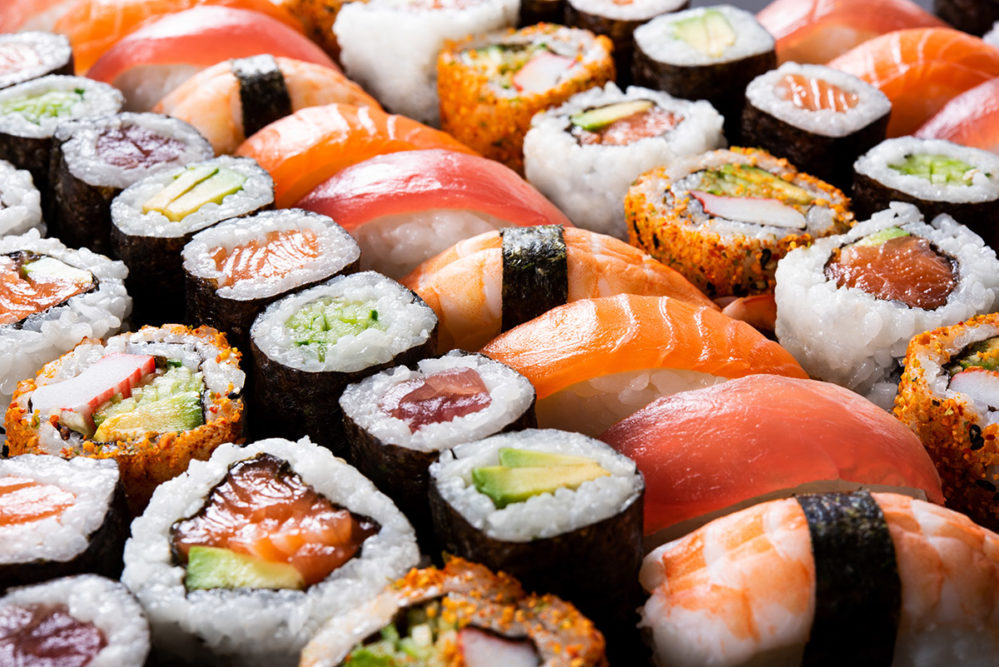Sushi growth in grocery deli prepared foods section has been “fantastic” over the past decade, said Ed Romero, president of CEO of Hana Group, whose Hana Group US division supplies freshly made instore sushi to Whole Foods, Sam’s Club, Costco and other US retailers.
“It’s one of the top categories in prepared deli, behind sandwiches, wraps and salads but bigger than soups” and other categories, Romero said. “It went from being very niche to now very mainstream.”
There are several reasons for the huge growth, he said.
One is an increase in quality. High-end suppliers like Hana Group have always provided top retail partners like Whole Foods with premium sushi. But lower down the retail ranks, quality has traditionally been much more spotty.
That has changed significantly in recent years.
“If you look back, in the US, there was a pretty sizable different in the quality of the experience from top to bottom,” Romero said. “Our number one client is Whole Foods, and ours has always been very close to restaurant-quality. More traditional supermarkets were nowhere near that. But the last couple of years, our competitors have elevated their game.”
The “poor quality” sushi providers have been mostly weeded out of the grocery world, he added. The quality of the sushi being sold today in grocery stores is typically “good” or “great.”
Another reason for sushi’s popularity, Romero said, is the increase in demand for grab-and-go and hand-held foods.
“Sushi is very portable. You can eat it on the go, you can eat it with your fingers or chopsticks.”
A third major reason for the category’s big growth is its health profile. Sushi typically has clean ingredients, very few or no preservatives and is filled with fish, rice, vegetables and other healthy foods, Romero said.
Club store fit
Hana Group’s most recent retail partnership in the US is with Sam’s Club, where Romero used to work.
The club store is a perfect fit for Hana Group, he said.
“One of the great things about the club channel is clubs are all about member value,” he said. “They offer either a great experience at a good price or a good experience at a fantastic price. We’re able to offer them premium product at a really good value, and it’s gone really well so far.”
Especially in the past couple of years, Sam’s Club has really upped their quality on items like premium beef, seafood and wine, Romero said.
FujiSan is the other sushi provider for Sam’s Club, and they are another provider of excellent premium-quality sushi, he said.
“We have a lot of respect for them, and it’s not easy to replace them,” he said. “We’re less concerned with replacing them than with just being a really good provider. We’d love to be everywhere, but we’re focusing on being the best providers we can be in the stores we have.”
Hana Group’s other club store customers include BJ’s and some Costco stores, Romero said.
Sushi consumers love variety, Romero said. California rolls, spicy salmon and a handful of others continue to be industry standards, but there’s also lots of room for experimentation.
Regional differences can play a significant role in what sushi does well, where. West Coast retailers are much more likely to want raw product, whereas those in the East and Midwest often prefer cooked product.
Some retailers prefer more traditional fare, others are excited about fusions and other more adventurous products. Some Southwest retailers might, for instance, want sushi with hatch chiles. And Hana Group makes a “buckeye” sushi roll featuring local spices from the Midwest.
“The entry point is an avocado and cucumber roll, but once they’re in the category, they start branching out into other areas — sriracha or another trendy spice.”
Hana Group also works with its retail partners to switch up its programs with limited-time-offer products, which might be available for a month or a quarter, for example.
Quality over quantity
There’s much room for growth in the grocery prepared sushi category. But Hana Group is more focused on quality than quantity.
“Our model is, we don’t want be everywhere,” Romero said. “We’re really selective. We have a 20-year-plus partnership with Whole Foods, and we’re hoping to get a long-term deal with Sam’s Club. We’re interested in premium and long-term partnerships.”
Hana Group has a variety of different brands for its retail grocery operations. Some partners choose to go with an established Hana brand, others to develop their own unique brand identity with the company.
“We try to create a real custom experience for our customers,” Romero said.
Guaranteeing a premium product and experience for retail partners and consumers begins with ingredients, Romero said.
“We purchase all of ours direct, and we have our own warehouse in Allentown, and we have partners in the West and Midwest wo do the warehousing and logistics only. We have good control of the supply chain.”
The company’s US business is largely a franchisee business, but half of the company’s instore kiosks are managed by its own employees.”
“And our franchisees are not really independent franchisees,” Romero said. “We manage them very closely, which allows us to have really good oversight and training to ensure we delivery a high-quality experience every day.”
This article is an excerpt from the April 2024 issue of Supermarket Perimeter. You can read the entire Sushi feature and more in the digital edition here.

